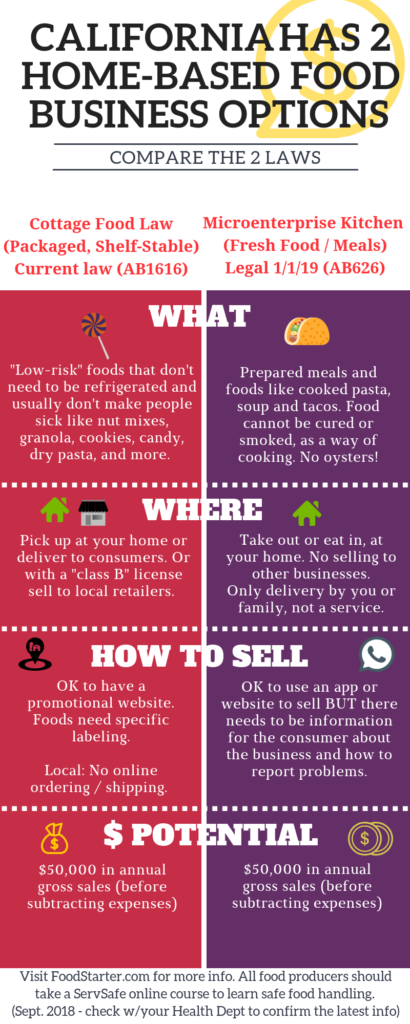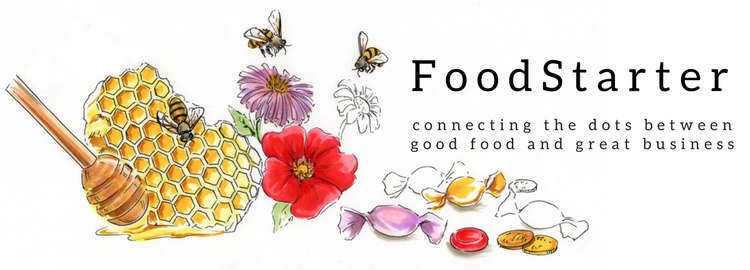 As of January 2019, California residents can legally sell prepared meals made at home as a Microenterprise Kitchen Operation, which is different from the Cottage / Homemade Food Law.
As of January 2019, California residents can legally sell prepared meals made at home as a Microenterprise Kitchen Operation, which is different from the Cottage / Homemade Food Law.
This page tells you about making and selling homemade packaged, shelf-stable foods.
Starting in January 2013, Assembly Bill 1616 (also known as AB-1616) California’s “cottage food law” allowing certain food products to be made and sold to certain people in certain quantities went into effect! On this page, I attempt to distill those certain nuances to answer the question: Can I sell the food I’m making at home in California? (Plot spoiler: DON’T ASK ME. Read the list of what you can sell.)
Here are a couple of articles to get started no matter what state (or state of mind) you’re in….
- What Home-based Food Businesses Should Know For Cottage Food Success
- How to Start a Home-Based Preserves Business
For California cottage food crafters
Keep tabs on the latest and resources on The Sustainable Economies Law Center website, the folks who led this monumental bill through to success. Also read this article in Forbes (Jan. 2015) on how the thousands of businesses the law has allowed to start up.
The rules are subject to change and you should not consider this blog post to be the be-all in terms of the most complete info. Check the California Department of Public Health for details on the law.
Why this great law got passed
Across the U.S., states are recognizing that the high cost of starting a food business as well as inaccessibility to kitchens complying with the laws are preventing many a micro-entrepreneur from getting started on a budget or running a small food business to supplement their income.
SECTION 1 of the bill lays the case out well:

What you can make?
Non-potentially hazardous foods are the type that if you found them in your sofa a month after falling through the cushions, you’d be able to eat them.
Disgusting metaphors aside, here are the details:
114365.5. (a) The department shall adopt and post on its Internet Web site a list of not potentially hazardous foods and their ethnic variations that are approved for sale by a cottage food operation. A cottage food product shall not be potentially hazardous food, as defined in Section 113871.
This list may not be complete or totally accurate: As the state learns what works and what doesn’t, the list can change, either expanding or contracting. Look at the official Approved Foods list and see how to request new foods to be added to the Approved Foods list.
Licensing Requirements
“This bill would require a cottage food operation to meet specified requirements relating to
- training,
- sanitation,
- preparation,
- labeling, and
- permissible types of sales and would subject a cottage food operation to inspections under specified circumstances.”
Per Section 5 110460. No person shall engage in the manufacture, packing, or holding of any processed food in this state unless the person has a valid registration from the department, except those engaged exclusively in the storing, handling, or processing of dried beans. The registration shall be valid for one calendar year from the date of issue, unless it is revoked. The registration shall not be transferable. This section shall not apply to a cottage food operation that is registered or has a permit pursuant to Section 114365.
Get a registration number to a “Class A” cottage food operation from your local health department that certifies you comply with the following. Registration number aside, imagine being one of your customers walking into your kitchen and seeing how you make your food. Following the Do Unto Others golden rule is a pretty good way to keep yourself in check. (Considering Ebay sellers often guarantee hard, non-food goods come from pet free homes, the more you can keep your pets away from your kitchen, the better.)
Take a class: (d) A person who prepares or packages cottage food products shall complete a food processor course instructed by the department to protect the public health within three months of becoming registered. The course shall not exceed four hours in length. The department shall work with the local enforcement agency to ensure that cottage food operators are properly notified of the location, date, and time of the classes offered.
Only some kitchens will require inspections, depending on your license: Thanks to Christina Oatfield for pointing out only for Class B licenses (selling indirectly to third parties, not consumers) will a home inspection be required, unless the local health department has suspicions (See: Do I need to have my kitchen inspected?). Use this law as the chance to exceed the bar in good health, good food and cleanliness! You don’t want to make the public sick
Pondering: The dried beans exemption fascinates me. Any idea where that came from?

Who can work in the home business
How you have to label it
For non-labeled / packaged items: SEC. 12. 114088.A cottage food product, as defined in Section 113758, that is served by a food facility without packaging or labeling, as described in Section 114365, shall be identified to the consumer as homemade on the menu, menu board, or other location that would reasonably inform a consumer of its homemade status.
If you’re selling unwrapped cookies at a pop-up market, you’d identify them as homemade through signage.
Where / to whom you can sell
Here’s that paragraph: (5) “Indirect sale” means an interaction between a cottage food operation, a third-party retailer, and a consumer, where the consumer purchases cottage food products made by the cottage food operation from a third-party retailer that holds a valid permit issued pursuant to Section 114381. Indirect sales include, but are not limited to, sales made to retail shops or to retail food facilities where food may be immediately consumed on the premises.
Geographic boundaries for selling
How much you can sell before you have to leave your kitchen
Per Section 7. 113758. the enterprise shall not have more than fifty thousand dollars ($50,000) in gross annual sales in the calendar year.
My take: Unless you have a very high margin food, meaning you can make it for almost nothing and demand a good price when selling, e.g. $1,000 wedding cakes — sans cream of course — or perhaps chicken broth, you won’t “get rich” from your cottage food operation. The intention is to help people grow local food economies, supplement income, prove a market for your food, and get started.
Please follow the law.
Much like a driver’s license, the cottage food law is a privilege, not a right. The more California and other states see these laws working, the more the laws will be expanded to allow increased venues for selling, food types, etc.
Should I start my food business at home just because I can?
The choice is up to you and depends how quickly you want to grow and how well you can dedicate your kitchen to your business. Using your home for a food business is a huge commitment in keeping clean, complying, and having space to make and store your food. A commercial kitchen is all set up and ready to go, with the utilities generally covered in your hourly fee. For dry goods, you may find a commercial kitchen the best investment.
Weigh the tradeoffs and make a decision based on your particular circumstances.
NEXT STEPS TO GET STARTED:
- Find your county’s Department of Public Health web page which will have licensing information as well as what’s required as far as your home / kitchen / storage facilities. Also see California’s Department of Public Health which oversees the law. Don’t ask me…I don’t know what your city requires.
Some health depts—which can also tell you about the new homemade prepared meal business law ( as a “Microenterprise Kitchen Operator”): Alameda County | San Francisco County | Kern County | Los Angeles County | Orange County - Find insurance. Budget $1-2,000 per year for insurance, according to one agent. If you find it for less, please report back to me!
- Join the Facebook group to connect with other people starting California cottage food businesses. Also search to see if folks in your county have started their own group.
- Contact your city to ask what other licenses and permits are required.
I’d love to hear any additional knowledge or reports of changes in this exciting but evolving new law! Would be excited to potentially interview those who start at home and transition to a commercial kitchen.
Susie





